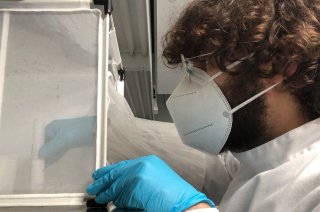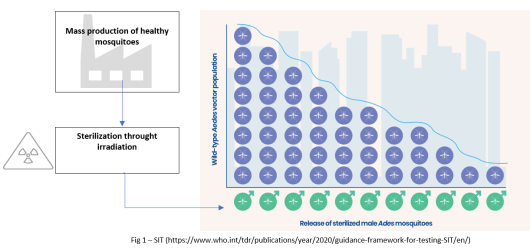
PhD project
Project 15 Experimental evolution of insect gut symbionts to improve fitness under SIT and transgenic mass release (UK)
Aedes mosquitoes are vectors for several arboviruses, including those that cause dengue, chikungunya, yellow fever and Zika. The incidence of Aedes aegypti, and therefore the potential for disease transmission is increasing, due to climate changes and urbanization. Vector control strategies are also changing in order to respond to this challenge, and to replace ineffective chemical pesticides.
The sterile insect technique (SIT) and the related Incompatible Insect Technique (IIT) are two alternative genetic that rely on area wide inundative release of mosquito males in order to suppress vector populations and hence reducing the risks of mosquito-borne disease transmission. More specifically, SIT is based on release of sterilized mass-reared males (Fig 1), whereas IIT takes advantage of the cytoplasmic incompatibility conferred by a specific bacteria, Wolbachia. Many of these technologies rely on large scale production of sterile males or self-limiting transgenic insects https://www.iaea.org/sites/default/files/aedes-who-iaea-2020.pdf. These techniques should address one vital point for their success: mass-reared sterile males must be able to compete effectively with wild type males for wild type females.
In this project we will be exploring how we can use microbes to increase the fitness of male Aedes aegypti mosquitoes. Bacteria in gut microbiome can play an important role on affecting nutrient assimilation, growth rate and vector competence. The focal point of the research is to unearth gut bacterial symbionts that could act, both singularly or otherwise in “concert”, positively (as mutualists) in producing high-quality mass Aedes aegypti mosquitoes, improving the efficiency of rearing systems. In addition to the above, I will explore the effects of the selected bacterial symbionts on the mating competitiveness between bacterial treated and untreated males, in both small and large mating cages. Conventional, axenic and gnotobiotic mosquitoes rearing protocols, will allow us to compare the effects of putative mutualistic symbionts. Mosquito larvae are aquatic and can acquire bacteria directly by filter feeding in the breeding water. Improving the mating competitiveness of mass-reared males could result in a mass release of less individuals for vector control programs, that will bring more consensus between citizens and a reduction of insects’ production costs. Furthermore, by using transcriptomic facilities, we aim to investigate and understand the impacts of mutualistic associations on insect immunity, nutrition and gene regulation.
This project could achieve as output more knowledge and data that can be used to reduce vector borne disease outbreaks. Understanding the relationships between the bacterial gut community and the hosts should improve opportunities and alternative techniques for mass rearing systems and fighting vector populations, by analysing the different situations, national regulations, permits and ethics statements. The host institution for this research project is the University of Exeter (UK), and secondments are taking place at the Wageningen University (NL) and FAO (AU).

